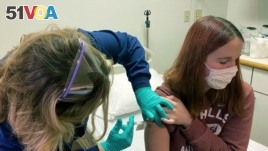01 November 2020
The hunt for a COVID-19 vaccine for children is only just beginning and that has some American pediatricians worried. Those doctors are concerned they may not know if any vaccine works for young children in time for the next school year.
Older adults may be most at risk from the coronavirus, but ending the COVID-19 pandemic will require vaccinating children, too. Last week, drug maker Pfizer received permission to test its vaccine in U.S. children as young as 12 years old. It is one of only a few tests around the world to consider if any of the experimental vaccines made for adults also can protect children.
"I just figured the more people they have to do tests on, the quicker they can put out a vaccine and people will be safe and healthy," said 16-year-old Katelyn Evans. She became the first teenager to get an injection in the Pfizer study at Cincinnati Children's Hospital in Ohio.

Clinical research coordinator Tammy Lewis-McCauley administers an injection as part of the hospital's clinical trial of Pfizer's COVID-19 vaccine at Cincinnati Children's Hospital Medical Center on Wednesday, Oct. 14, 2020. (Cincinnati Children's Hospital Medical Center via AP)
Several possible vaccines are in studies in tens of thousands of adults. Scientists hope they will find evidence that some of them are safe and effective enough for widespread use.
But when the first vaccines are ready, they are unlikely to be approved for children. Vaccines cannot be given to youngsters unless they have been tested in their age group. This is a big problem for efforts to reopen schools and restart other activities.
"The public doesn't understand that," said Doctor Evan Anderson of Emory University, in Georgia. He has been pushing for COVID-19 vaccine tests for children.
While Anderson is pleased by Pfizer's study in teenagers, he finds it "very concerning" that children younger than 12 may not have a vaccine by a year from now.
Children represent about 10 percent of COVID-19 cases documented in the United States. Children are far less likely than adults to get very sick, but about 120 have died just in the U.S., notes the American Academy of Pediatrics (AAP). That is about how many U.S. children die from influenza each year. In addition, a small number of children have developed a serious inflammatory condition linked to coronavirus.
Anderson says COVID-19′s effect on children is greater than some other diseases that require pediatric vaccinations.
Also unclear is the question of how easily children can infect others. In a letter to federal health officials, the AAP noted evidence that those over age 10 may spread the virus just as easily as adults do.
It is not right to ask "children to take on great burdens during this pandemic but not have the opportunity to benefit from a vaccine," wrote Dr. Sara Goza. She is president of the American Academy of Pediatrics.
Around the world, some studies are just beginning. In China, two companies, Sinovac and SinoPharm, have launched studies that can test children as young as 3.
A British study of a vaccine by AstraZeneca permits testing of a small amount of the drug in children. But the company says it will not be doing any tests until it has more safety information from adults.
Testing children is critical, said Dr. Robert Frenck. He operates the Vaccine Research Center at Cincinnati Children's.
Vaccinating children and teenagers will have "the effect of keeping those children from getting infected. But then also they don't bring the infection home to parents and grandparents," he said.
After Frenck announced Pfizer's testing for teenagers, 90 families contacted him for more information. The researchers now say they plan to test 12- to 15-year-olds soon.
Teenager Katelyn Evans does not know if she got the real vaccine or not. Tests give some people the real vaccine, while others get a placebo to compare the results. But she is pleased to be part of the study.
If the Pfizer vaccine works in adults and teenagers without any harmful effects, researchers can begin testing it on younger children. Those studies will be very different and more complex, adds Anderson, because children may need smaller amounts and their natural defenses against disease react differently to vaccines.
I'm Susan Shand.
The Associated Press reported this story. Susan Shand adapted it for Learning English. George Grow was the editor.
__________________________________________________
Words In This Story
pediatrician – n. a doctor who specializes in tracing children
pandemic - n. a contagious disease that effects many countries
teenager - n. a child between the ages of 13-19
inflammatory - n. being swollen and hot
burden - n. heavy demands on someone
benefit - n. something that is to a person's advantage
placebo - n. fake medicine used in medical testing